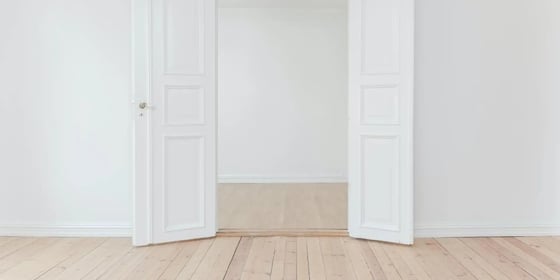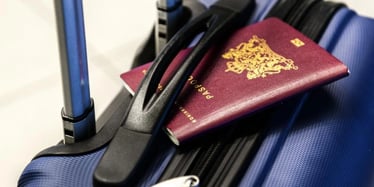How To Rent an Apartment in Germany

Contents
You want to start your life in Germany? Finding an apartment can be a challenging process due to the variety of housing options and numerous platforms to explore. Whether you're looking for a budget-friendly flat or a luxurious living space, there are plenty of resources available to help you find the perfect rental.With patience and determination, you can successfully navigate the rental market and secure a home that fits your needs and budget. In this guide, you will find all the information you need to make the process smoother and more efficient.
Renting an apartment in Germany as a foreigner: First steps
Renting a flat in Germany involves careful planning and organization. The first step is to set a realistic budget. Consider your total monthly income and determine how much you can afford to spend on rent and utilities. Typically, the rental price should not exceed one-third of your monthly income. Remember to factor in additional costs such as electricity, internet, and TV license fees.
Note: When renting, you'll come across the terms "cold rent" (Kaltmiete) and "warm rent" (Warmmiete). Cold rent refers to the base cost of renting the apartment itself, excluding any additional expenses. This is the amount you pay solely for the use of the living space. Warm rent includes the cold rent plus additional costs such as heating, water, and other utilities. It provides a more comprehensive overview of your total monthly rental expenses.
Next, decide which region or city you want to live in. Germany offers a wide variety of living environments, from bustling urban centers to quieter suburban or rural areas. Research different regions to understand the cost of living, lifestyle, job opportunities, and amenities available. For example, cities like Berlin, Munich, and Hamburg are known for their vibrant cultural scenes and higher cost of living, while smaller towns may offer more affordable housing and a slower pace of life.
Once you have a budget and preferred region in mind, explore the different types of housing options available. Thanks to specific platforms, we'll go through some of the many types of apartment rentals available and how your search for one will be easier.
Types of accommodation on the German rental market
The German market offers a variety of accommodation options to suit different needs and preferences. Understanding these options can help you find the ideal living space. Here’s an overview of the most common types of accommodations available:
Unfurnished vs. furnished apartments in Germany
When renting a property in Germany, one of the key decisions you'll face is whether to choose a furnished or unfurnished apartment. Each option has its own advantages and disadvantages, which you'll need to consider based on your personal needs and circumstances.
- Furnished apartments are typically ready to move into, with all necessary furniture and appliances included. They are ideal for short-term stays, temporary accommodation for expats, or those who do not have their own furniture. Due to the added convenience, they tend to be more expensive than unfurnished apartments.
- Unfurnished apartments, on the other hand, are usually empty and require tenants to provide their own furniture and appliances. This allows tenants to personalize their space and is generally more cost-effective for long-term rentals.
Different types of apartments for rent
When searching for an apartment in Germany, it's important to consider the type of living arrangement that best suits your needs. From shared apartments (Wohngemeinschaft or WG) that are popular among students and young professionals to single apartments offering more privacy and larger family apartments designed for comfort, there are various options to explore.
Shared apartments (Wohngemeinschaft or WG): A Wohngemeinschaft, or shared apartment, is a popular option, especially among students and young professionals. In a WG, you rent a single room in a larger apartment shared with other tenants. This setup helps reduce costs and fosters a social environment when you first live in Germany. Common areas, such as the kitchen and bathroom, are shared.
Single apartments: These are private apartments intended for individual tenants. They offer more privacy and independence compared to shared apartments. Single apartments can vary in size from studio flats to one-bedroom units and are suitable for living alone.
Family apartments: These are larger apartments designed to accommodate families. They typically have multiple bedrooms and more living space to provide comfort for all family members. Family apartments can be found in various settings, from urban centers to suburban neighborhoods.
The difference between Altbau & Neubau
In some apartment advertisements, you will find the terms "Altbau" or "Neubau". Altbau refers to buildings constructed before World War II. These apartments are known for their character, featuring high ceilings, wooden floors, and historical details. While charming, they may come with higher heating costs and require more maintenance. Neubau apartments are modern buildings constructed after World War II. They often feature contemporary designs, energy-efficient systems, and modern amenities. Neubau apartments are typically easier to maintain and may offer additional facilities such as elevators and underground parking.
Apartment search in Germany: Where to find a place to rent?
Finding a place to rent can be a daunting task, but there are several effective ways to go about it, both online and offline.
Offline methods can yield good results, especially in less competitive markets or for those seeking a more personal touch. Many landlords still advertise rental properties in the classifieds section of local newspapers. Look for the real estate section and check daily or weekly publications. Universities, community centers, and supermarkets often have notice boards with rental listings. This can be a great way to find local deals, especially in student areas.
Engaging a real estate agent (Makler) can be particularly useful if you’re new to the country or have specific requirements that make the search more challenging, for example if you look for a house in Germany. Maklers have access to extensive networks and can help you find properties that may not be listed online. Agents can save you time and provide professional assistance with the rental process, including negotiations and paperwork.
But be aware that this typically involves a fee, usually equivalent to 1-2 months' rent, depending on the service agreement.
Online platforms are the most popular and convenient way to find rental properties in Germany. Many websites offer extensive listings and allow you to filter results based on your preferences and budget.
Websites to find apartments in Germany
Now that you know what types of apartments are available, it's time to start your search! Here are some of the best renting websites in Germany, divided by type of apartment!
Shared flat
WG-gesucht: WG-gesucht is a website specializing in shared apartments, making it a great resource if you're looking for a WG. You can search for apartments by city and find information on rent, size, and amenities on the website. You can also read reviews from other users to get an idea of the apartment.
Facebook groups: There are numerous Facebook groups dedicated to apartment hunting in Germany. These can be a great way to find an apartment, especially if you're looking for something specific. For example, if you want to find a studio apartment in Frankfurt, you can join the group Studio Apartments in Frankfurt and begin your search.
Single Flats and Family Apartments
ImmobilienScout 24: One of the most popular websites for finding apartments in Germany, ImmobilienScout 24 has a wide selection of listings. You can search for apartments by city, rent price, and the number of rooms. Additionally, you can also sign up for email alerts to notify you whenever a new listing that meets your criteria is posted.
Immowelt: Immowelt is one of Germany's leading online platforms for finding apartments to rent. With over 1.5 million listings, Immowelt has the largest selection of apartments and homes available for rent. Immowelt lets you not only rent but also acquire houses, land, commercial, and foreign real estate. Whether you're looking for temporary housing in Berlin or buying a home in Frankfurt, you can find it on Immowelt.
Immonet: Another good website for finding rental properties is Immonet. Here you can search for apartments, rooms, and houses to rent in all of the major German cities. Additionally, Immonet also provides you to search by keyword, so if you're looking for a cheap apartment in Berlin or renting an apartment in Munich, you can easily find what you need.
Rentberry: Rentberry is one of Germany's most popular rental platforms, offering a wide range of services to make your renting experience as smooth and hassle-free as possible.
These include rent insurance and rent payment plans, helping you feel more secure in your rental agreement. And with Rentberry's chat and email customer support, you can be sure that help is always on hand if you need it.
Furnished Apartments
Nestpick: If you're looking for a furnished apartment, Nestpick is an excellent option. They also have a wide range of apartments, from shared flats to luxury rentals. In addition to finding available listings, Nestpick also provides information on rent prices and other helpful tips for moving to Germany.
Wunderflats: You can also check out the website and app Wunderflats. It offers a wide range of flats all over Germany, with the option to filter your search by city, price range, size, and more.
When you find an apartment you're interested in, click "Request a booking" and fill out the form. Wunderflats will get in touch with the landlord to confirm your booking.
HousingAnywhere: This website is specifically designed for students who are looking for housing in a foreign country. Whether you're a student studying abroad, or just visiting for a few months, rent an apartment in Germany through HousingAnywhere and enjoy all the comforts of home without breaking the bank.
If you're looking for a great deal on rent, Expatrio has partnered with HousingAnywhere to offer you some amazing discounts on rent all across Germany. Click here for more information.
Applying for an Apartment or other Rental Properties in Germany
Before you start applying for apartments, ensure you have all the required documents ready. Landlords in Germany expect potential tenants to present a complete and organized application package.
Necessary Documents
- Passport/ID: A valid passport or identification card.
- Proof of Income: Recent pay slips or a letter from your employer verifying your salary and employment status.
- Schufa Credit Report: A credit report showing your financial reliability. This is crucial for proving your ability to pay rent consistently.
- References: Letters of recommendation from previous landlords if available.
- Proof of Employment: A contract or letter from your employer confirming your employment.
- Visa: Ensure your visa and residence permit are valid and up to date
- Completed Rental Application Form: Some landlords may have a specific form that you need to fill out.
Use the websites mentioned earlier to find potential apartments. Schedule viewings as soon as possible, as the rental market in Germany can be very competitive. Be punctual and prepared for these appointments, as first impressions are crucial.
Getting a Rental Contract
Once you have found an apartment you want to rent, submit your application promptly. Make sure your application package is complete and well-organized. If it is successful, the landlord will offer you a rental contract. It’s essential to read this contract carefully before signing.
- Understand the rental terms of the lease, including the duration, notice period, and any specific conditions.
- Clarify the amount of rent, additional costs (such as utilities), and the security deposit, usually equivalent to three months' rent.
- Ensure the contract includes a condition report of the property, detailing any existing damages.
Once you are satisfied with the terms, sign the contract. Both you and the landlord will keep a copy. Pay the deposit and the first month’s rent as specified in the contract.
Registering your Address (Anmeldung)
After moving in, you must register your new address at the local registration office (Bürgeramt) within two weeks. This process is called "Anmeldung" and is mandatory for all residents in Germany. You will need to bring your rental contract, a completed registration form (available at the Bürgeramt), your passport or ID, and a confirmation of residency from your landlord (Wohnungsgeberbestätigung).
4 Tips for Finding Your New Home
Renting an apartment in Germany can be competitive and requires careful planning. Here are four essential tips to help you secure your ideal apartment:
Start Your Search Early
Demand for rental properties is high, especially in major cities like Berlin, Munich, and Frankfurt. Begin your search at least three months before you plan to move. This gives you enough time to explore different options, attend viewings, and complete the application process without the pressure of an impending move.
Understanding Monthly Rent
The rent in Germany is usually due monthly, and it’s common practice to set up automatic bank transfers to ensure timely payment to the landlord. It’s crucial to pay rent on time, as late payments can lead to penalties or even eviction.
Additionally, when signing a lease, you will often need to pay a security deposit (Kaution), which is usually equivalent to three months' rent. This deposit is held by the landlord and returned at the end of your tenancy, provided there are no damages or unpaid rent.
Familiarize Yourself with Contracts
Rental contracts in Germany are legally binding documents that outline the terms and conditions of your lease. Before signing, make sure you fully understand the duration of the lease, notice period, rent amount, and any additional costs. Contracts typically include clauses about maintenance responsibilities and house rules. If you’re unsure about any terms, seek clarification from the landlord or a legal advisor.
Build a Good Relationship with Your Landlord
Building a positive relationship with your landlord can be beneficial throughout your tenancy. Communicate clearly and promptly about any issues or repairs needed in the apartment. Respect the property and adhere to the house rules. A good relationship can lead to smoother negotiations and may even help you when renewing your lease or getting references for future rentals.
How to rent a House in Germany
While owning a house is more common in Germany, renting a house is a viable option, particularly for those with large families or a preference for spacious living and outdoor space. Whether you need more room or enjoy spending your afternoons in the garden, renting a house in Germany follows a process similar to renting a flat, with some specific considerations.
Types of Houses
Houses for rent are less common than apartments, as homeownership is generally preferred. However, you can find rental houses in suburban areas, small towns, and sometimes even within city limits. The availability may vary greatly depending on the region and market demand.
- Detached Houses (Einfamilienhaus): Standalone homes that offer the most privacy and space, typically with a garden.
- Semi-Detached Houses (Doppelhaushälfte): These houses share one common wall with another house. They offer a balance of space and cost efficiency.
- Terraced Houses (Reihenhaus): Part of a row of houses, these homes share walls on both sides but still provide individual living spaces and often small gardens.
Renting a house is quite similar to renting a flat, with a few additional considerations. It often comes with the responsibility of maintaining the garden and possibly other outdoor areas. Make sure to clarify these responsibilities with the landlord.
Utilities and Heating: Larger spaces can mean higher utility costs, especially for heating during the winter. Factor these into your budget when considering a house.
Good luck!
Expatrio Value Package
Simplify your move to Germany with Expatrio's Value Package! Get your mandatory Health Insurance + Blocked Account + free Expatrio Bank Account, and other free benefits!
This might also be of interest to you

How to Move to Germany as an American in 2025
Germany is one of the most popular destinations for Americans looking to relocate to Europe. Whether you’re moving for work, education, or simply for...

German Months
Fundamental to learning any language is becoming familiar with how to talk about days, weeks, months, and years. Mastering how to communicate about...

German Culture
Germany is home to over 80 million people – as well as a diverse array of religions, customs, and traditions that make up the rich national psyche....

Costs of Living in Germany
Anyone planning on moving to or studying in Germany needs to know exactly how much it is going to cost to live there. Part of planning this exciting...

15 Best Places To Visit In Germany [Guide]
Germany is a fascinating country with an abundance of attractions that draw tourists from all over the world. From the vibrant city life of Berlin to...

Visa for Germany - A Complete Guide for All Visa Types
A visa is necessary for many individuals moving to Germany to live, work, or study. There are several different types of visa in Germany, and it’s...

Tourism in Germany
Germany Tourism: Why Germany is one of the top tourist attractions in the world Visiting Germany's most famous cities is a top priority for many. But...

Insurances in Germany
“Germans have insurance for everything” - that might sound superficial but it is true. German insurance system offers a wide choice of ways to ensure...
